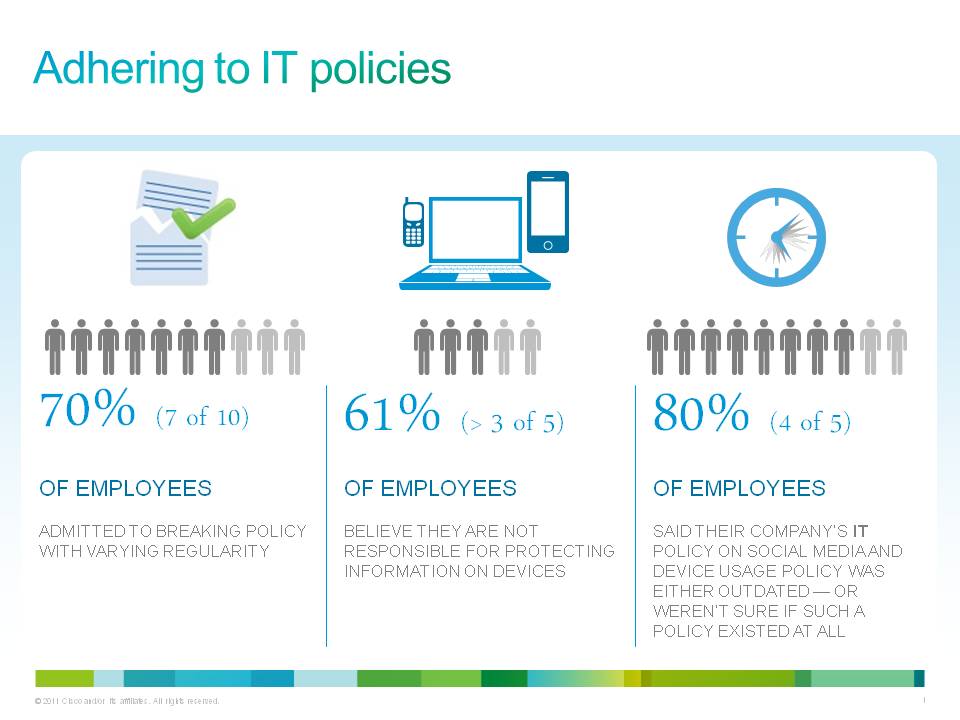
This week, the third and final chapter of the 2011 Cisco Connected World Technology Report (CCWTR) was released. The CCWTR surveyed 2,800 students and young employees in 14 countries including Canada, the U.S., Australia and the United Kingdom. The final chapter revealed startling attitudes toward IT policies and the growing security threats posed by the next generation of employees entering the workforce – a demographic that grew up with the Internet and has an increasingly on-demand lifestyle that mixes personal and business activity in the workplace.
The first chapter, released earlier this fall, revealed that students and young employees under 30, regardless of where they lived, considered the Internet and being connected as a basic necessity of how they go about their lives, ranking it ahead of a need for a car. The study results suggested that the next generation worker is learning how to deal with constant disruptions even when working on important projects. 90% of Canadian students report being disrupted by social media at least once every hour with almost one in four reporting interruptions more than six times an hour, or every 10 minutes. It also confirmed the norm within young employees to blur personal and work lives where 70% of young employees “friend” their co-workers and even managers.
The second chapter focused on the expectations and priorities of young employees and university or college students entering the workforce. Organizations looking to hire the best and brightest young individuals need to take note. The study found the expectation of the next-generation workforce is increasingly emphasizing work flexibility, social media freedom, mobility, and non-traditional workstyles. When asked, over 40% of the individuals indicated they would prioritize these items over salary when accepting job offers. More than half of students and young employees want the ability to access corporate networks from their personal mobile devices and computers.
As younger workers enter the workforce there is always a transition and learning process associated with the difference between appropriate behaviour in college or university and in the workplace. Chapter three’s findings are key in explaining how this next-generation workforce’s behaviour heightens personal and corporate risk amid a complex threat landscape, a correlation that is spotlighted in more depth in the Cisco 2011 Annual Security Report.

Adhering to IT Policies
Some proof points around this casual behaviour towards security include:
– Almost one in 3 Canadian young employees and students admitted to accessing a neighbour’s wireless connection without permission. This was 12% higher than global counterparts.
– Nearly 9 out of 10 students allow others to use their own computer unsupervised and over 25% of students admitted to leaving personal belongings and devices unattended in public while getting something to eat or drink at a café or going to the restroom.
– One in three college students globally does not mind sharing personal information online, believes privacy boundaries are loosening, or does not think about privacy, providing foreshadowing for how the next generation of the global workforce will address information online – perhaps for business as well as personal activities.
These attitudes can bear startling results. Over 20% of students and employees experienced identity theft before the age of 30. Organizations need to be aware that the majority of employees believe it’s the company’s responsibility to protect information and devices – not their own. The ability to ensure policy compliance involving social media, devices, and remote access is testing the limits of traditional corporate cultures and placing greater pressure on recruiters, hiring managers and IT departments to allow more flexibility.
IT teams need to continue to address their mobile device policies as the tablet wave increases. Balancing the security needs of the organization with the device mobility and freedom that will garner Canadian businesses the best talent will continue to be a challenge. Both the world and employees are changing and organizations will need to plan to keep up with this new norm.
2 Comments
Thank you for your comment. You are absolutely right around the need for clear policies. We have seen in our own employees that increased freedom can lead to significant gains in motivation and productivity but boundaries are essential. One thing that we have found very successful in our organization is developing strong mentor program for new young employees.
Frightening and exciting at the same time. As personal and professional seems to be intersecting more and more, companies need to develop and adapt clear policies for sharing sensitive information. It strikes me as beyond risky to hire employees that have little concept of ‘privacy’. The “best and brightest” should know what responsible behaviour is in any situation.
Great article.